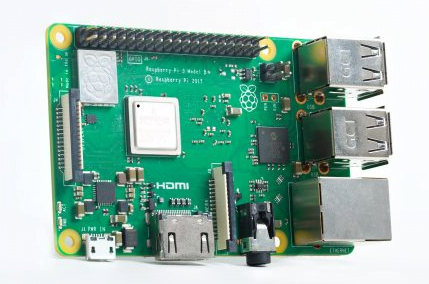When the first Raspberry Pi arrived in 2012, it made a big impact on the development of cheap and small computers. However, the product started to fall behind as more refined models came to the market. Now, the makers of Raspberry Pi have come up with an updated model addressing the limitations of the previous versions.
On Wednesday, the Raspberry Pi Foundation launched the Raspberry Pi 3 Model B+. Compared to its predecessor – the Raspberry Pi 3 Model B – the latest variant comes with a faster CPU and faster wireless throughput. The new variant comes two years after the Pi 3 Model B, following the foundation’s two-year B+ ‘evolution’ upgrade.
Talking about the specs, the Raspberry Pi 3 Model B+ is powered by a 1.4GHz 64-bit quad-core Broadcom Arm Cortex A53-architecture processor. The earlier version had a 1.2GHz CPU. The upgraded processor results in a 15% performance improvement. The new processor is not only faster, but also comes with a heat spreader and power integrity optimizations to better manage the temperature.
“The new product is built around BCM2837B0, an updated version of the 64-bit Broadcom application processor used in Raspberry Pi 3B, which incorporates power integrity optimisations, and a heat spreader,” the foundation says in a blog post announcing the new product.
Further, the Raspberry Pi 3 Model B+ supports Bluetooth 4.2, Bluetooth Low Energy, and dual-band wireless local-area networks at 2.4GHz and 5GHz. According to the foundation, the dual-band wireless LAN is backed by modular compliance certification. The certification would make it easier and cheaper to commercially launch products based on the latest board. Also, it would lower the wireless LAN compliance testing, notes ZDNet.
Further, for users who prefer wired to wireless, the Raspberry Pi 3 Model B+ is integrated with an upgraded LAN chip from Microchip. The upgraded chip supports Gigabit Ethernet, resulting in performance improvement. “While the USB 2.0 connection to the application processor limits the available bandwidth, we still see roughly a threefold increase in throughput compared to Raspberry Pi 3B,” the blog post reads.
Upgraded specs in the B+ also lead to more power consumption than the previous boards. However, the improved power integrity of the Broadcom chip takes care of the throttling. The chip, which runs at 1.4GHz, throttles down to 1.2GHz if the temperatures exceed 70 degrees Celsius. It throttles down further beyond 80 degrees (an unlikely event), notes PCMag. “Like a modern smartphone, we treat the thermal mass of the device as a resource, to be spent carefully with the goal of optimising user experience,” the foundation says.
Overall, the latest Pi variant is pretty similar to the last one when it comes to the form factor and plugs. It’s a good thing though as it will work well with the existing Pi cases and accessories. The latest offering can now be ordered online for $35 (same price as before). As of now, the foundation has revealed no plans to discount or end production of the older models.
According to Eben Upton, co-creator of the popular developer board, they will continue to build the earlier models as long as there is demand. Further, the executive confirmed that there would be no change in the pricing of the earlier models. Raspberry Pi 1B+ will continue to sell for $25, Pi 2B and Pi 3B for $35.
Meanwhile, Upton also gave some hint of the Raspberry Pi 4. Speaking to TechRepublic, Upton said, “It’s not a Raspberry Pi 4. I think what we’ve ended up with is something which is a really good B+, a bit too good for a B+, but that would be not really anywhere near enough for a Raspberry Pi 4.”
Upton also revealed some sales figures. The foundation has so far sold about 19 million Raspberry Pis, including more than nine million Raspberry Pi 3 units. In July 2017, Upton told that they had sold 14 million Raspberry Pi computers, while in March 2017, the number was 12.5 million units. In September 2016, the sales number was around 10 million units.
These numbers are surely a remarkable achievement for a product, when the original objective was to encourage more people to choose computer science at the University of Cambridge. The board has proved extremely popular among the startups and hobbyists, who want to test new ideas with minimum spending. Some competitors to Raspberry Pi are: Orange Pi Project Board, Banana Pi Single Board Compute, ASUS Tinker Board, and Beagleboard.





